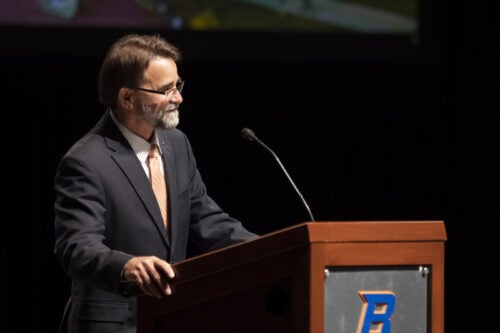
Boise State University Interim President Martin Schimpf announced plans for a new teaching facility to expand lab opportunities in chemistry and biology, lauded a series of industry and community partnerships, and highlighted the continued worldwide growth of Boise State’s online degree and certificate programs during the university’s annual fall address.
Schimpf, a longtime professor of chemistry and the former provost and vice president for academic affairs, is leading Boise State while the State Board of Education completes a search for the university’s next president.
“After 28 years at Boise State, I couldn’t be more proud of this institution and what we’ve accomplished over the past couple of decades,” Schimpf said. “And as a peer and a coworker with all of you over the years I can say with certainty, that this will be yet another year of growing quality, unexpected innovation, increased student success, and outstanding research and creative activity — you know, just another typical year at Boise State.”
Schimpf announced that the university’s scholarship campaign, which doubled its goal and raised more than $50 million, had an immediate impact: The university was able to hand out more than 33 percent more donor-funded scholarships to Boise State students last year than the year before.
He called on a similar campus-wide effort for the university’s first crowdfunding Giving Day, set for September 13.
Schimpf explained Boise State’s commitment to several statewide priorities, including a push to expand access to free educational materials that can help keep college costs down. And he committed to leading a “a deep and substantial self-evaluation of our efforts and effectiveness in inclusive excellence” — taking on the national challenge of creating a welcoming and diverse community that also celebrates and encourages free speech.
Schimpf affirmed Boise State’s continued commitment to taking students “beyond the major,” augmenting what is required for their degrees with certificates, internships and more that are connected with the workplace. They help prepare students to succeed in their first professional jobs, as well as into their careers.
Schimpf celebrated Boise State’s climbing retention and graduation rates and its explosive growth in doctoral programming. Boise State now has some 324 Ph.D. students in 11 programs, including two of the fastest-growing in university history, each in just its second year: A Ph.D. in Ecology, Evolution and Behavior that has 16 students and a Ph.D. in Computing that has 30 students.
In fact, as Schimpf pointed out, Boise State is in the midst of launching 29 degrees and certificates over last year and this year — including the first online master’s degree in genetic counseling in the country.
“I don’t think it’s in Boise State’s DNA to sit around while we wait for a new president, do you?” he said.